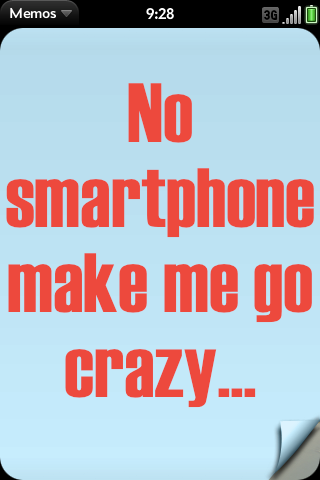Since I first got a smartphone in 2006, I've told people I couldn't imagine going back to using a feature phone and carrying around a paper planner. Recently, I accidentally smashed my Palm Pre, marring its sleek touchscreen with cracks radiating from the bottom. I eventually decided to replace it with a Palm Pre Plus. Before the new smartphone came, I was without one for about ten days.

So how did I survive? I made it using short-term solutions like keeping my to-do lists on a note card in my wallet. It helped that the Pre's operating system, webOS, syncs with Google Calendar and Gmail contacts: All of that data was available online, so I didn't forget appointments or lose phone numbers. Once I got the Pre Plus, signing in to my Palm Profile automatically pulled all that calendar and contact information, plus apps and settings, back onto my new phone. Very nice experience.
(Tangent: Conversely, because smartphones are essentially computers, why can't I do everything that I can do on my smartphone on my computer? The drive toward smartphones has been fueled by the opposite [wanting to email, browse the web, and run applications on a mobile phone], but making computers capable of accessing data from your phone, and do everything your phone can do, is very valuable too. For example, Google Voice is great because it lets you make calls and send text messages from your computer.)
The Bad: No Email, Maps, or Podcasts
Not being able to check email on the go was the worst part. When I'm out, I like to see if anything important is happening. I know, sometimes this makes me seem like an addict -- though not as bad as the "Crackberry" users you see jumping every time their phone vibrates. But there are times it's a real time-saver to check your phone. For example, I had driven 45 minutes from home to get to one appointment, and wanted to see if a nearby contact could meet afterwards. When I left the first appointment, I wished I had my smartphone to check my email to see if the other contact was available. There have also been times I've been out, have read an email, and been able to respond to it in a few minutes when I was waiting around. That's one less thing I have to deal with when I get home, where there are a million other things I could be doing. Anything that lets me be productive in spare moments when I'm on the go is a plus.
Being unable to find businesses nearby was also very inconvenient. I come by this honestly: Before I had a smartphone, I used to keep a copy of the Yellow Pages (remember phone books?) in my car so I could find a business without returning home. Thankfully, smartphones took care of that need, but without one, I couldn't find nearby restaurants, directions, or movie times.
Not having podcasts on my drive to work was also a drawback. I like to make good use of my commuting time by listening to podcasts about entrepreneurship (Entrepreneurial Thought Leaders), smartphone app development (Mobile Orchard), marketing (Duct Tape Marketing), and finance (Planet Money). Instead, I listened to National Public Radio over the air, which gave me a broader view of the world, but not everything was of interest.
Missing my digital to-do list of recurring tasks was a pain. One of the biggest reasons I started using a digital to-do list and calendar was to keep track of tasks that I have to do every week, month, or the like. Classic for webOS lets me keep using the task list I developed over years on my Palm Treo. On a digital to-do list, it's really easy to remind yourself to change the air filter in your home's air conditioner every two months; whereas with a paper system, you run into problems when you have to switch to the next year's pages. Plus, if you need to change the filter a couple weeks early, you have to cross out all the future entries and move them two weeks earlier.
Finally, not having my Palm Pre just led to a lot of short time segments without anything to do, like play games. For example, when I'm on the subway, I'll play a game like Bubbles! to occupy me during, say, the train stopping for no reason (this is the DC Metro, after all). Reading a newspaper is also a good distraction, but there's only so much content in the free papers, so I usually run out of things to read when I make a round trip.
The Good: Fewer Distractions
Perhaps the biggest benefit of my smartphone-free time was just realizing that I could survive without a smartphone, at least for a while. There's something peaceful about being temporarily unreachable by email. I definitely still got stressed during my day, so I wouldn't say going without a smartphone made a major improvement in my state of mind. I did find that it made me feel less busy because I didn't have something to do (like check email or play games) every minute. I'm not sure if I filled that time with brilliant thinking, but it probably left me a little less fidgety. Also, my wife sometimes asks me to put down my Pre, so being without it solved that!
And any electronic device you carry around, whether it be a smartphone or a laptop computer, requires some babysitting. I'm talking about making sure the battery is charged, seeing if you have wireless signal, getting the Bluetooth headset to work with it, and so on. So being without my smartphone did leave me with fewer things in my pocket -- and fewer things to worry about.
But I'm glad to have my smartphone back.



This post has been featured on front page of HackerNews! And thanks for all the tweets, tweeps!